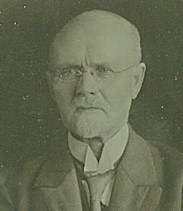Max Wagenknecht
Max Otto Arnold Wagenknecht (born August 14, 1857 in Woldisch Tychow , Pomerania , Prussia ; † May 7, 1922 in Anklam , Pomerania, Prussia) was a German composer of organ and piano music . His best-known work is Opus 5, 58 preludes and epilogues . The work demonstrates a special talent for melodic organ compositions.
Life
Max Wagenknecht was the son of the teacher Julius Ernst Karl Wagenknecht and Seraphine Emilie Tugendreich Siefert. He was made familiar with music at an early age and later studied piano and organ playing. A scholarship that he received around 1875 enabled him to continue his studies at the Hochschule für Musik in Berlin (now the University of the Arts Berlin ), which he completed around 1880.
In Franzburg , where Wagenknecht had become a lecturer at the teacher training college, he met his future wife Meta Benz, whom he married in 1885. With her he had two children, Gertrud Wagenknecht (1886–1970) and Georg Wagenknecht (1889–1951).
As a music teacher at the Vorpommerschen teachers' seminar in Franzburg and from 1901 organist and composer in Anklam, he completed Opus 5, 58 preludes and epilogues in July 1889 . During this time Wagenknecht was also involved in the building and restoration of organs, gave several concerts and directed several orchestras.
Works (selection)
The total number of musical works by Max Wagenknecht is not known. Only the following of his compositions have been preserved:
- Opus 1: Three Polkas for Piano
- Opus 2: Rhinelander for violin and flute to accompany piano
- Opus 3: Three songs with text by Schanz, Kletke and Reinick for piano accompaniment
- Opus 5: 58 preludes and epilogues, 58 short pieces for organ and a fughette and fugue
- Opus 10, 13 and 14: Songs for piano accompaniment
Web links
| personal data | |
|---|---|
| SURNAME | Wagenknecht, Max |
| ALTERNATIVE NAMES | Wagenknecht, Max Otto Arnold (full name) |
| BRIEF DESCRIPTION | German composer |
| DATE OF BIRTH | August 14, 1857 |
| PLACE OF BIRTH | Woldisch Tychow , Pomerania, Prussia |
| DATE OF DEATH | May 7, 1922 |
| Place of death | Anklam , Pomerania, Prussia |
